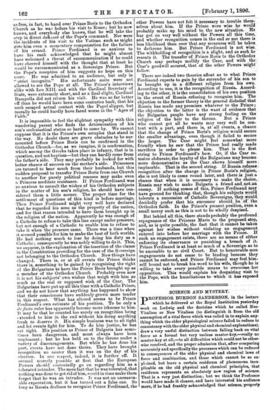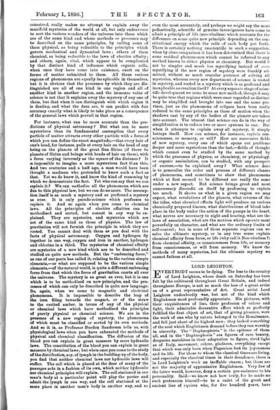SCEENCE AND MYSTERY.
PROFESSOR BIIRDON SANDERSON, in the lecture which he delivered at the Royal Institution yesterday week on Ludwig and the doctrine which he called Neo- Vitalism or New Vitalism (to distinguish it from the old assumption of a vital force which was called in to explain any- thing which the older physiological science failed to reduce to consistency with the older physical and chemical explanations), drew a very useful distinction between falling back on vital force as a formal but very useless master.key,—really no master-key at all.—to all difficulties which could not be other- wise resolved, and the proper admission that, after comparing accurately and specifically the processes which can be reduced to consequences of the older physical and chemical laws of force and combination, and those which cannot be so ex. ;Alined, but leave a certain residuum of phenomena inex- plicable on the old physical and chemical principles, that residuum represents an absolutely new region of science. That is a very just distinction; but we think the Professor would have made it clearer, and have interested his audience more, if he had frankly acknowledged that science, properly
conceived, really makes no attempt to explain away the , manifold mysteries of the world at all, but only endeavours to sort the various wonders of the universe into those which are of the same kind and whose methods or processes may be described on the same principles, by calling some of them physical, as being reducible to the principles which govern mechanical and dynamical laws ; others of them chemical, as being reducible to the laws of elective affinity ; and others, again, vital, which appear to be complicated by that distinct kind of influence which organic cells, when once they have come into existence, exert on the forms of matter submitted to them. All these various regions of phenomena are equally inexplicable in themselves, but it is obvious that the processes by which they are dis- tinguished are all of one kind in one region and all of another kind in another region, and the immense value of science is not that it explains away the mystery of any one of them, but that when it can distinguish with which region it is dealing, and what the data are, it can predict with fair accuracy exactly what is likely to take place as a consequence of the general laws which prevail in that region.
For instance, what can be more accurate than the pre- dictions of physical astronomy ? But what can be more mysterious than its fundamental assumption that every particle of matter attracts every other particle with a force of which you can define the exact magnitude,—that every hair of one's head, for instance, pulls at every hair on the head of any being on the planets of the great Sun Sirius (if there be planets of Sirius and beings with heads of hair on them), with a force varying inversely as the square of the distance ? It is impossible to imagine a more mysterious fact than this. And two centuries and a half ago, a man would have been thought a madman who pretended to know such a fact as that. Yet we do know it, and know the kind of reasoning by which we demonstrate the fact. Yet who can say that we can explain it ? We can Inelltodise all the phenomena which are due to this physical law, but we can do no more. The assump- tion itself is as much a mystery and as profound a mystery as ever. It is only pseudo-science which professes to explain it. And so again when you come to chemical laws. All the principles of elective affinities can be methodised and sorted, but cannot in any way be ex- plained. They are mysteries, and mysteries which are not of the same kind as those of physics. The law of gravitation will not furnish the principle in which they are rooted. You cannot deal with them as you deal with the facts of physical astronomy. Oxygen and hydrogen fly together in one way, oxygen and iron in another, hydrogen and chlorine in a third. The mysteries of chemical affinity are mysteries of a new kind which are to be described and studied on quite new methods. But the "embracing force," as one of our poets has called it, relating to the various simple elements,—or what are supposed to be the various simple elements,—of the natural world, is quite a different embracing force from that which the force of gravitation exerts all over the universe. The mystery is as great as ever, but it is one which is to be methodised on new principles, and the pro- cesses of which can only be described in quite new language. Bo, again, when we come to magnetic and electrical phenomena. It is impossible to describe the leap of the iron filing towards the magnet, or of the straw to the excited amber, in terms of any of the physical or chemical laws which have methodised the principles of purely physical or chemical science. We are in the presence of a new region of mystery, the phenomena of which must be classified or sorted by its own methods. And so it is, as Professor Burdon Sanderson tells us, with physiological laws when you have exhausted the methods of physical and chemical classification. The diffusion of the blood you can explain in great measure by mere hydraulic laws. The constitution of the blood you can explain in great measure by chemical laws; but when once you come to the study of the distribution, say, of lymph in the building-up of the body, you find that neither chemical laws nor hydraulic laws will suffice. The cell which is placed at the door of many of the passages acts in a fashion of its own, which neither hydraulic nor chemical principles will explain. The cell stationed in one man's body at a particular point will play the porter and admit the lymph in one way, and the cell stationed at the same place in another man's body in another way, and so even the most accurately, and perhaps we might say the most pedantically, scientific of genuine investigators have come to admit a principle of life (neo-vitalism) which accounts for the difference on some quite new principle depending on the con- stitutional energy which the cells of each body put forth. There is certainly nothing unscientific in such a suggestion, when by close comparison it has been determined that there is some residual phenomenon which cannot be referred to any method known to either physics or chemistry. But would it not be simpler and much /ass mystifying instead of more mystifying if the new region of mystery were frankly ad- mitted, without so much oracular pretence of solving all mysteries, whereas every new department of science is rooted in mystery, and rooted in a mystery which is as profound and inexplicable as creation itself? At every separate stage of scien- tific development we come to some new method, though it may be quite true that regions which were once regarded as distinct may be simplified and brought into one and the same pro- vince, just as the phenomena of eclipses have been really reduced to the same principles as those of motion when the shadows cast by any of the bodies of the planets are taken into account. The utmost that science can do in the way of simplification is to reduce two or more systems to one. But when it attempts to explain away all mystery, it simply betrays itself. How can science, for instance, explain con- sciousness, or memory, or will ? How are successive fields of new mystery, every one of which opens out problems deeper and more mysterious than the last,—fields of thought which cannot even be studied by the same method by which the processes of physics, or chemistry, or physiology, or organic assimilation, can be studied, with any prospect of success,—to be explained away? What science does is to generalise the order and process of different classes of phenomena, and sometimes to show that phenomena which at first seemed to be different are really the same under a new aspect. But science brings great and most unnecessary discredit on itself by professing to explain too much. It shows us what in a given region we may expect, what revolutions of the planets, what returns of the the tides, what chemical effects light will produce on various chemically prepared tissues, what distributions of blood take place in the body under the action of the pumps in the heart, what nerves are necessary to sight and hearing, what are the laws of association, what are the motives which operate most powerfully on character, and what are the ordinary limits of self-control ; but in none of these separate regions can we solve the ultimate mystery, or in any true sense explain chemical affinity from force, or life (why call it Neo-vitalism ?) from chemical affinity, or consciousness from life, or memory from consciousness, or will from memory. We know the methods of many mysteries, but the ultimate mystery we cannot fathom at all.







































 Previous page
Previous page